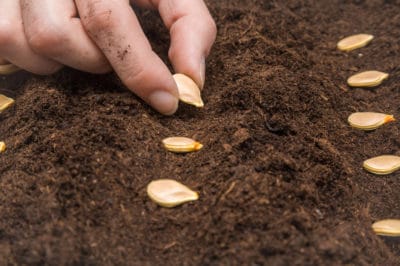Choosing the Right Pumpkin Seeds
The only thing limiting the kind of pumpkin seeds you want to plant is your imagination. With so many different varieties to choose from, it is impossible not to find one or more you wish to plant. However, there are a few questions you should ask yourself before deciding the variety you want.
- How much growing space do you have?
- Do you want to carve Jack O’Lanterns or make pie?
- How long is your growing season?
Once you have answered these questions, you can then decide what type you would like to grow. Some varieties such as Giant pumpkins require a longer growing season, about 125 days, before harvest, while the small decorative kinds ripen around 80-85 days.
How Large Does my Garden Have to Be?
Although gardeners typically plant pumpkins in a garden with room for the plants to spread out, having a large plot of land is not necessary. You can plant in a small raised garden bed or even a large planting container such as a 20 gallon (76 liters) planting pot.
Tip: Extra-large varieties of pumpkins do not thrive in a container. If space is an issue, try a smaller variety such as sugar or decorative pumpkins.
When Do I Plant My Seeds?
Once you have chosen the variety and decided where you want the pumpkins to grow, you can plant the seeds. As long as you plant after the last heavy frost and the soil has reached a consistent temperature of 65°F (18°C), the seeds will germinate readily. Be sure to plant them one inch (2.5 centimeters) beneath the surface.
If you live in one of the Northern growing zones where the season is shorter, and you are not growing a miniature pumpkin variety, you will need to start your seeds indoors. To do so, plant the seeds in a peat pot, place in a sunny location, and keep the soil moist. Within 7-10 days, they should begin to germinate.
After germination, the plants are still not ready to be placed outdoors. Instead, two sets of leaves should have formed, and the plants should be sturdy. Allow 4-6 weeks for the plants to reach optimum maturity for transplanting outdoors.
Tip: You can also purchase ready-to-plant seedlings from your local nursery or home and garden store.
What Kind of Soil Do I Need?
Although pumpkins thrive in a variety of soil types, it is always best to add some organic matter to the soil before planting. Well-ripened compost and manure worked into the soil will provide valuable nutrition while the seeds are germinating.
Tip: If you do not have ready access to compost, organic compost and steer manure can be purchased at most nurseries.
What If My Seeds Do Not Sprout?
Occasionally, you may notice that your pumpkin seeds do not sprout within 7-10 days of planting. Unsprouted seeds mean that for a variety of reasons the seeds did not germinate. If all of the seeds fail to sprout, either the ground was not warm enough, or the batch of seeds itself was defective.
However, you cannot expect every seed you plant to eventually become a plant. Most packaged seeds have a germination rate of approximately 85%, and planting multiple seeds in each hill or row will guarantee you have enough plants to make up for any seeds that do not germinate.
Tip: Before planting, check the expiration date on the package of seeds to be sure they are fresh enough to plant.
Where Can I Buy Seed?
Pumpkin seeds of all varieties are typically available at home and garden stores, or at nurseries. Additionally, seeds can be purchased online at various websites.
An excellent place to purchase organic pumpkin seeds is from local farmers who save seeds or websites that offer seed exchanges. Buying organic seeds often improves the quality of the harvest, and you can usually find varieties of seeds that you are unable to get from a package store.
Regardless of where you choose to purchase your pumpkin seeds, knowing how to plant them is key to growing a successful crop. Once you have mastered planting, the fun of raising the pumpkin seeds begins.
KP
